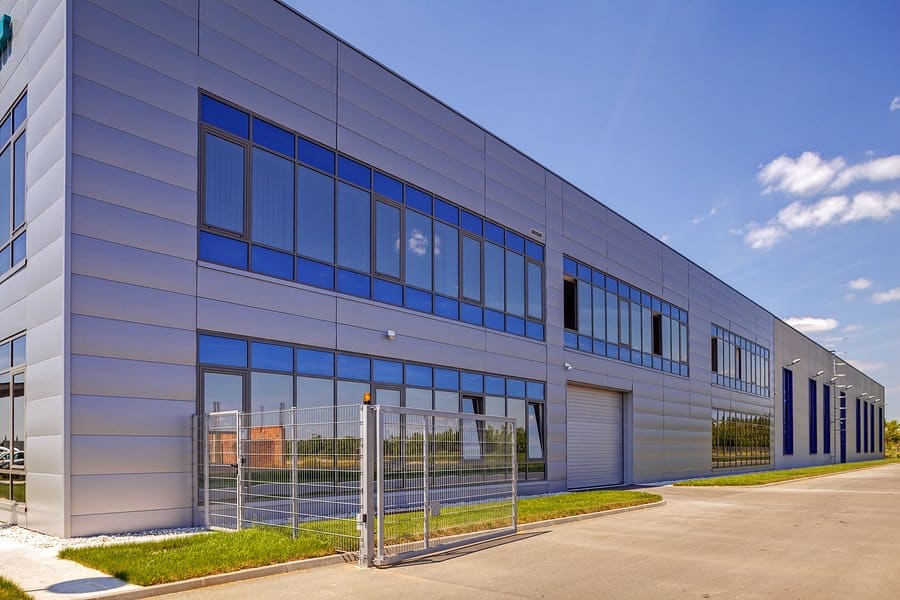Commercial applications have widely adopted aluminum windows for over 50 years, and their quality and functionality have significantly evolved during this period.
Today’s commercial aluminum windows are more durable, stronger, and more cost-effective than ever. That’s why they are utilized in some commercial applications, from new construction projects to replacements and storefront renovations.
Aluminum windows have numerous advantages in industrial applications. They’re long-lasting; they commonly last two decades or more with proper window installation. They’re high-performing and provide quality insulation. Plus, they’re cost-effective, offering some of the most competitive prices on the market.
Despite all the pros, there are some disadvantages to installing aluminum windows. Aluminum doesn’t achieve as long service life as wood windows, for instance, and aluminum storefront windows may not be as efficient as wood or vinyl windows due to aluminum’s high heat and cold conductance.
What Are Aluminum Windows?
Aluminum windows have aluminum frames. Aluminum is a popular material for window frames because it is lightweight, strong, durable, and resistant to corrosion. It comes in various styles and designs, including casement, sliding, double-hung, and fixed windows. The frames can be powder-coated in various colors to match the exterior of the building or to provide a contrasting look.
Aluminum windows are popular in commercial buildings and modern homes because they offer a sleek, contemporary look and are easy to maintain. They are also energy-efficient and can help reduce energy costs by keeping heat inside during the winter and out during the summer. Additionally, aluminum windows are recyclable, making them a sustainable choice for environmentally conscious consumers.
Are you considering different types of windows for your commercial property? Here’s a look at the pros and cons of commercial aluminum windows:
Pros of Aluminum Windows in Commercial Properties
Aluminum windows offer a number of advantages over wood, vinyl, and fiberglass windows. The durability, low maintenance, and design flexibility of aluminum contribute to its preference in commercial applications. These features make aluminum windows a popular choice for such settings. A few advantages include:
- Durability – Compared to other window materials, aluminum is much more resistant to the elements and UV rays. Aluminum is very stable in cold and hot weather, meaning it does not expand and contract as quickly as vinyl. This helps to prevent seals from being prematurely broken. And unlike wood, aluminum is not susceptible to decay and infestations.
- Design Flexibility—Aluminum windows are easy to customize and offer numerous options for colors or finishes. Therefore, they can be customized to match a particular project’s design needs. Wood and vinyl windows offer more limited customization options.
- Performance – In tests, aluminum windows consistently achieve the highest AAMA (American Architectural Manufacturers Association) Performance Grades. Aluminum windows are much more likely to meet AW and CW standards, which’re applicable for use in high-rise and mid-rise properties. Vinyl and wood windows, on the other hand, do not regularly achieve performance grades for high-rise developments.
- Eco-Friendliness – Aluminum’s easy recyclability allows it to be frequently remelted without losing strength, making aluminum windows often contain a significant amount of recycled content. Compared to synthetic materials and wood, producing aluminum windows leaves a smaller environmental footprint.
Aluminum Window Cons in Commercial Installations
Although aluminum has clear advantages, the material does fall short in a few areas. For example, vinyl and fiberglass windows tend to be more cost-effective but may last fewer years. Plus, aluminum windows can’t achieve the same high-end look of wood windows. Here are some of the disadvantages:
- Aesthetics – Aluminum does have design versatility. The material is available in numerous colors. But wood and vinyl windows tend to have more aesthetically pleasing options and styles.
- Mid-Range Cost – Aluminum windows tend to be in the middle of the pack regarding cost. Although there are options that may initially cost less; they tend to fall short regarding performance and durability. In other words, aluminum windows tend to offer the best value, because they’re affordable AND offer a long, low-maintenance life cycle.
- Efficiency – Aluminum tends to be a high conductor of hot and cold, which when not properly protected against, can bring unwanted cold or heat into an interior space. Today, thorough installers combat this problem with thermal breaks and other offsetting measures.

